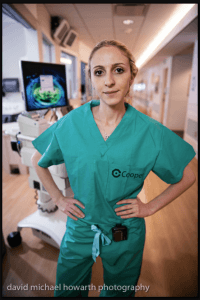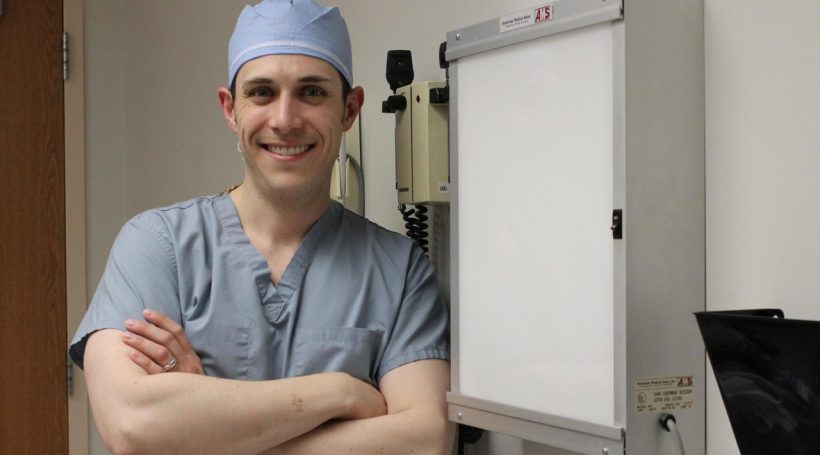Anna Goldenberg and Roy Sandau met at UMDNJ when she was in medical school and he was a surgical resident. So even before they married, they knew exactly what they were in for. Today, Sandau is an attending surgeon and Goldenberg a third year resident at UMDNJ-SOM. For both, the hours are long, the schedule is demanding and family time is in short supply.
For the Cherry Hill couple and their 3-year-old daughter, life happens mostly in the hours just before bed. In the interest of squeezing every last drop out of the day, Goldenberg says she and Sandau rarely go to sleep before 12:30 or 1 am.
 “I’m used to it,” she says. “I sleep probably four-and-a-half hours a night, and I’ve adapted well to that.”
“I’m used to it,” she says. “I sleep probably four-and-a-half hours a night, and I’ve adapted well to that.”
She means it too. She doesn’t sound exhausted by the work; she sounds excited about it. She rotates between Lourdes, Kennedy Health System and Cooper University Health Care. Sandau does the same but also puts in time at Virtua. He specializes in laparoscopic robotic surgery.
Goldenberg has two years left in her residency and gets to “do everything from seeing patients on the floor to working in private practices. I’ll work on transplants and a lot of general surgery. A lot of the time we get calls from the emergency room – some nights can be quiet, and some nights you could be operating all the time.”
She hopes to go into plastic surgery and expects that she’ll be especially well-served by the breadth of her residency experience. Surprisingly, she remains energized by the whole process.
Surgical residency is notoriously labor intensive. Talk to surgical residents like Goldenberg, and they’ll tell you the demanding hours are justified by the incredible wealth of experience gained during this stage of professional development.
Whereas the general medical residency is roughly three years, surgical residency is typically a five-year undertaking from internship through medical licensing and eventually to board certification.
This means that residents like 32-year-old Devin Flaherty have endeavored through roughly a decade-and-a-half of schooling and training to get where they are today. Now nearing the end of his fourth year as a surgical resident at UMDNJ-SOM, Flaherty has been at it even longer than most.
Flaherty earned a dual degree in 2009, graduating from medical school in Fort Worth, Texas with a DO and a PhD. He describes the six years required for completion as “a long haul. I didn’t go in intending to do that. But I found myself interested in surgery as well as research…It was the right time, I found a good project. I got a lot of research done and achieved my PhD.”
As with Goldenberg, Flaherty gives the impression of a budding surgeon more enamored at the opportunities ahead than intimidated by the stamina required of him. Particularly, in combining his penchant for research with his desire to practice oncologic surgery, Flaherty finds no shortage of chances for professional enrichment. He says that “with the cases that I do, I’m documenting and doing reviews with patients I’ve operated on. I actually get to analyze the results of these operations and publish them, so that’s pretty neat.”
The heavy caseload has given Flaherty invaluable hands-on experience but he does concede that “sleep is pretty tight.”
Naturally, sleep isn’t the only thing surgical residents surrender. Family time is also a major casualty. Take residents and married couple Mike and Katie Kwiatt of Stratford. They live in the eye of a surgical residency perfect storm. Both at Cooper University Hospital, Katie is in her fourth year as an anesthesia resident and Mike will be chief resident next year. Like Goldenberg and Flaherty, Mike recognizes that the demands on his schedule are a necessary occupational hazard.
“All residencies have extraordinary time demands,” he says. “The one thing that makes surgery especially difficult is that the schedule can be unpredictable. Most of the surgeries we’re in are scheduled, but an unexpected finding in a routine case or an added emergency case can lead to a late night operating.”
These demands will only intensify in the coming months when Mike assumes his new role as chief resident. With the title comes even greater responsibility. “I’ll be on call every third night,” Mike says. “I’ll also be doing more complex cases, which tend to last longer and run later into the night. The chief residents are also responsible for the emergency cases coming in through the ER.”
Mike describes a day in the life of a soon-to-be chief surgical resident: “I typically start my day at the hospital at 5:30 am. First thing in the morning I make rounds on all the patients on the service. This has to be done by 6:45 in order to make it to the OR on time, which starts at 7 am. I’ll typically have two to five surgeries during the day, depending on the surgical service I’m on that month. Between cases I’ll round with the attending surgeons and see inpatient consults. The end of the day can be highly variable depending on how long the cases last in the OR and if there are any emergency surgeries. I usually finish up my day sometime between 6 and 9 pm.
With only four or five scheduled days off each month, Mike has difficulty making plans outside of the hospital. Any day might produce an unforeseen emergency or a case that runs unexpectedly late into the night. This is normal for a surgical resident, but the uncertainty is twice as great in the Kwiatt household.
Mike points out that “Katie faces many of the same challenges with an unpredictable schedule. With both of us being residents, we’ve both been the spouse that gets caught in the hospital late in the night, and we’ve both been the spouse at home wondering when the other is going to come home. It’s much harder to be the spouse waiting at home.”
Literally months at a time have passed where Mike and Katie didn’t have a day off together. They live in the same house and work in the same hospital – guess where they see more of each other.
“During one tough stretch last year,” Mike says, “Katie and I didn’t see each other outside of the hospital for about a week and at the hospital we were only seeing each other briefly in the morning. One night I was on trauma call operating at about 3 am. Toward the end of the case I looked over the drapes and Katie was the anesthetist for the case. That case was probably the most I’d seen her all week.”
Just in case you thought things might soon get easier for the Kwiatts, they are expecting their first child this summer. “We don’t know what we’re in for,” Mike admits. “With most daycare facilities not opening before we start work and closing before we’re done with work, arranging childcare is certainly going to be a challenge. Our families are going to help us out, and we are going to have to rely on them until we’re done with residency next year.”
The Kwiatts could take a note from Goldenberg and Sandau, who confirm that support from extended family is indeed critical to survival. “My parents are great,” says Goldenberg. “They watch my daughter when I need them to. It’s important to have family around to help when you need it.”
Also important is a marriage of great fortitude and compromise. During particularly long shifts, Goldenberg says, Sandau will visit her at the hospital with daughter and dinner in tow.
Flaherty’s experience has been similar. Flaherty says he and his wife Janet, a realtor in Cherry Hill, “both work, and we both work a lot. There have always been events that I’ve missed, and trips I didn’t make. There’s no flexibility…You have a lot of learning to do in five years, and you get a chance to take a lot cases.”
The offshoot, he says, is a life lived in a perpetual time crunch, constantly rushing from the house, leaving things behind, missing flights. “You have to have a very understanding spouse in this line of work,” he says.
Putting aside the prerequisites of internal drive and external support, surviving a surgical residency with one’s wits intact requires a genuine passion for the work. For the hours that one must invest, anything less than total commitment is simply not enough.
“A career in medicine requires personal sacrifice,” Mike says. “Choose a specialty that excites and challenges you in order to make the sacrifice worthwhile.”
Flaherty says the same, noting that the incredible workload also means an incredible opportunity to help others. Rotating between six or seven different facilities, Flaherty observes that “anywhere you go there are going to be cancer cases, but we have a chance to cure that with surgery, so that’s nice.”
As for the toll that this demanding work might take on one’s personal life, one’s marriage and one’s family, Goldenberg says simply and genuinely, “we’ve made it work.”














